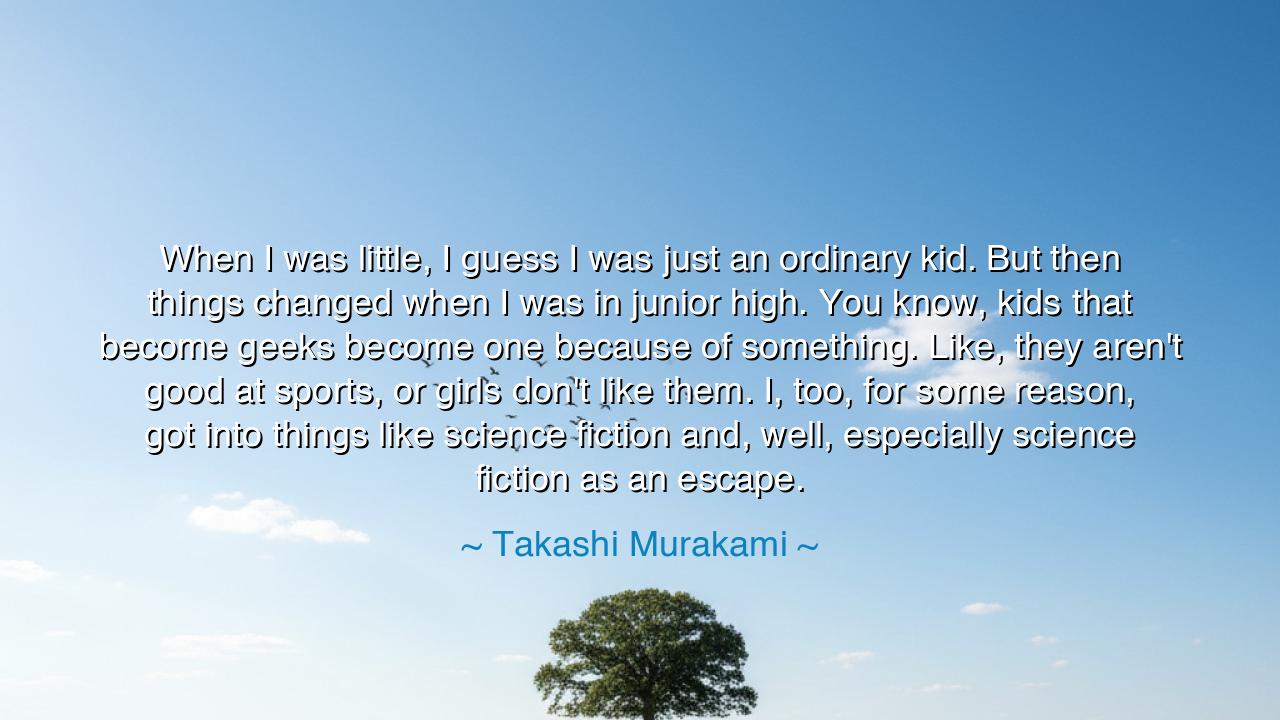
When I was little, I guess I was just an ordinary kid. But then
When I was little, I guess I was just an ordinary kid. But then things changed when I was in junior high. You know, kids that become geeks become one because of something. Like, they aren't good at sports, or girls don't like them. I, too, for some reason, got into things like science fiction and, well, especially science fiction as an escape.






Hear, O children of the future, the words of Takashi Murakami, a man who, like many before him, found solace in the realms of imagination and science fiction. He once said: "When I was little, I guess I was just an ordinary kid. But then things changed when I was in junior high. You know, kids that become geeks become one because of something. Like, they aren't good at sports, or girls don't like them. I, too, for some reason, got into things like science fiction and, well, especially science fiction as an escape." These words speak of the journey of self-discovery, of finding refuge in a world of ideas, of retreating into a universe where the rules of society and acceptance no longer hold sway. Murakami's story is not unique; it is the story of countless others who have sought meaning, identity, and comfort beyond the confines of their immediate surroundings.
In the ancient world, the young minds who felt like outsiders—those who did not fit the traditional molds of their society—often turned to philosophy and the mystical arts for their escape. Socrates, for example, was not the ideal Athenian, adored by all; his was a life of questioning, of seeking answers in places where others dared not go. He was an outsider, a nonconformist, and yet, it was through his curiosity and rejection of the ordinary that he became one of the most influential figures in Western thought. In a similar vein, Murakami speaks of how his immersion in science fiction was not a sign of weakness, but of strength—a way of navigating the world when the world itself felt unfriendly or inadequate.
For Murakami, as for many others, science fiction became not just an escape, but a means of transformation. It was a realm where imagination ruled, where the rules of the physical world could be bent, broken, and redefined. In the stories of space travel, time loops, and alien encounters, there was a freedom that could not be found in the mundane struggles of the everyday. Science fiction became the vessel of possibility, a space where the boundaries of reality were stretched and where the imagination could roam freely, without limits. For those who found themselves on the fringes of society, it was a world where they could find their place—not based on the standards of others, but based on their own ideas and dreams.
Think, O wise ones, of Isaac Asimov, the great science fiction writer whose works were not merely stories of the future, but meditations on the human condition. Asimov, like Murakami, was an outsider of sorts—though he was not a social recluse, he was a man of the mind, a lover of ideas rather than fame or popularity. Through his books, Asimov gave a generation of readers not just an escape, but a framework for understanding the complexities of technology, society, and the future. In his stories, he made the unknown familiar and the impossible seem possible. Like Murakami, Asimov used science fiction as both a personal refuge and a universal language, through which ideas could be explored and futures imagined.
The lesson here, O children of time, is that the path of the so-called "geek" is often a path of discovery—a journey into realms that others may dismiss but that hold the key to understanding the deepest aspects of the self and the world. To be a geek, to embrace things that others might not understand, is to embrace the power of curiosity and the strength of individuality. In a world that often values conformity, those who seek solace in science fiction, philosophy, or art often discover truths that cannot be found in the everyday. They uncover a deeper understanding of what it means to be human, to question, and to create.
So, O children of wisdom, do not fear the journey of the outsider, for it is through the eyes of the outsider that many of the greatest insights into the human experience are born. Embrace your unique interests, your individual passions, and understand that they are the very things that will guide you to greatness. Do not be ashamed to follow a path that may not always be understood by others, for the road less traveled is often the one that leads to discovery, creativity, and invention. Like Murakami, let your imagination and curiosity be your compass, and let them lead you to worlds of possibility and to truths that others might overlook.
Rise, O seekers of truth, and let your passions be the fuel that drives you toward the future. Embrace the geek within, for in science fiction, philosophy, and every realm of ideas that beckon you, there is a chance to create a world that reflects your deepest dreams. Let your escape become your path, and in doing so, you will discover that the world you create in your mind is often the world that will shape the future.






AAdministratorAdministrator
Welcome, honored guests. Please leave a comment, we will respond soon